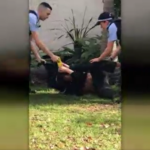Footage Released of NSW Police Using Excessive Force Against Elderly Woman

While the outrage that New South Wales police tasered a 95-year old dementia patient in a Cooma nursing home last week continues to simmer, another disturbing story has emerged.
Footage has now surfaced of of six police officers using two sets of handcuffs and significant physical force to detain a confused, elderly woman who suffers from dementia as she lay on the floor.
The 2020 incident is yet another example of heavily armed police officers using what appears to be excessive and unnecessary force on our frail and elderly.
The incident
In the police body camera footage, 81-year old Rachel Grahame is seen distressed and confused, screaming in pain at the tightness of the restraints police put on her and the force being used by the burly officers.
Officers were called to St Basil’s aged care home in Randwick in Sydney on 31 October 2020, after Ms Grahame took some papers and an electronic tablet from a nursing station.
One of the nurses snatched the items back and Ms Grahame grabbed the nurse’s clothes in response. When police arrived, the elderly woman was still in possession of the nurse’s badge, lanyard and identification card.
Police says that when they arrived, Ms Grahame “struck out at one officer with her arm, striking the officer on the arm twice”, adding that the elderly woman was trying to bite, kick and strike police while they held her arms and legs, that police were “unable to reason with her” and that she was speaking “incoherently throughout the encounter”.
The officers detained Ms Grahame. One pair of handcuffs was removed because it was too tight, although another set which police allegedly said was “looser” was left on her for more than 20 minutes.
When paramedics arrived, they told police that Ms Grahame needed to be taken to hospital as a result of injuries she sustained during the encounter.
She spent the following six weeks there.
Ms Grahame’s family took the New South Wales Police Force to court, launching civil proceedings for assault, battery and false imprisonment.
Police settled the case in November 2021 paying compensation for their treatment of the elderly woman. Needless to say, it is the state’s taxpayers who will foot the bill.
None of the officers involved in the incident were disciplined.
The family is now speaking out, because they say while they were compensated, they were not able to convince the police force to have the officers undergo mental health training.
Lack of mental health training
PACER – a pilot program which teams mental health clinicians up with police and paramedics to respond to triple-000 call-outs when there is a mentally ill person involved, needs to be urgently expanded across the whole of New South Wales.
As these two incidents show, it could potentially have application in the aged care sector, dealing with dementia patients too.
It has long been recognised that police are inadequately trained and ill-equipped to deal with mentally ill people, and yet, typically, they are first responders to any disturbance or altercation. Police can, in fact, often be a ‘trigger’ for mentally ill people – and then situations escalate, and the potential for tragedy increases, particularly when police feel the need to use force or weapons.
Despite showing significant positive results since its inception in 2018, for whatever reason, lack of funding, or lack of experienced staff, perhaps lack of political will, PACER remains fairly low-key. The important thing to note is that while PACER is intended to be victim-focused, it can keep police safer too.
The Aged Care crisis
But, another conversation is occurring on social media currently, sparked by comments made by the operators of Yallambee Lodge nursing home where Clare Nowland was tasered that ‘staff followed protocol’ by calling police.
It’s reasonably common knowledge that dementia patients can be unpredictable, and sometimes aggressive, uncooperative or incoherent, however, isn’t there also an expectation that when people who suffer dementia are put into special care facilities, that staff working in those facilities would be well trained and experienced in dealing with a wide variety of these types of circumstances, without the need for police intervention?
If, by their professional judgement, calling the police is the best option during an incident then shouldn’t there be a more cooperative effort between the health professionals and police to subdue a patient, with arrest or weapons used only as a measure of last resort in extreme circumstances?
These are questions that also desperately need answers. The final report made by the Royal Commission into Aged Care Quality and Safety was tabled in Federal Parliament two years ago, however many of the recommendations have not been implemented, despite aged care reform being a key promise of Anthony Albanese’s political campaign – the campaign that saw him elected to Prime Minister.
Treating the frail and elderly like criminals
Both of these women were delicate and elderly – weighing less than 50 kilograms.
It’s difficult for any of us to reason that they posed a significant threat or imminent danger to those around them.
It’s harder still for many of us to reconcile that these women were treated as if they were dangerous criminals, rather than as mentally disturbed, vulnerable people in need of help.
But, speculation, of course, is only speculation without the facts, and we don’t have all the information, which is why it is so disappointing that NSW Police are refusing to release body camera footage of the incident involving Clare Nowland.
It could offer valuable insights into how we can set better standards and make sure that tasers and forceful restraints by multiple police officers don’t become a normal standard of policing when dealing with mentally fragile people.







